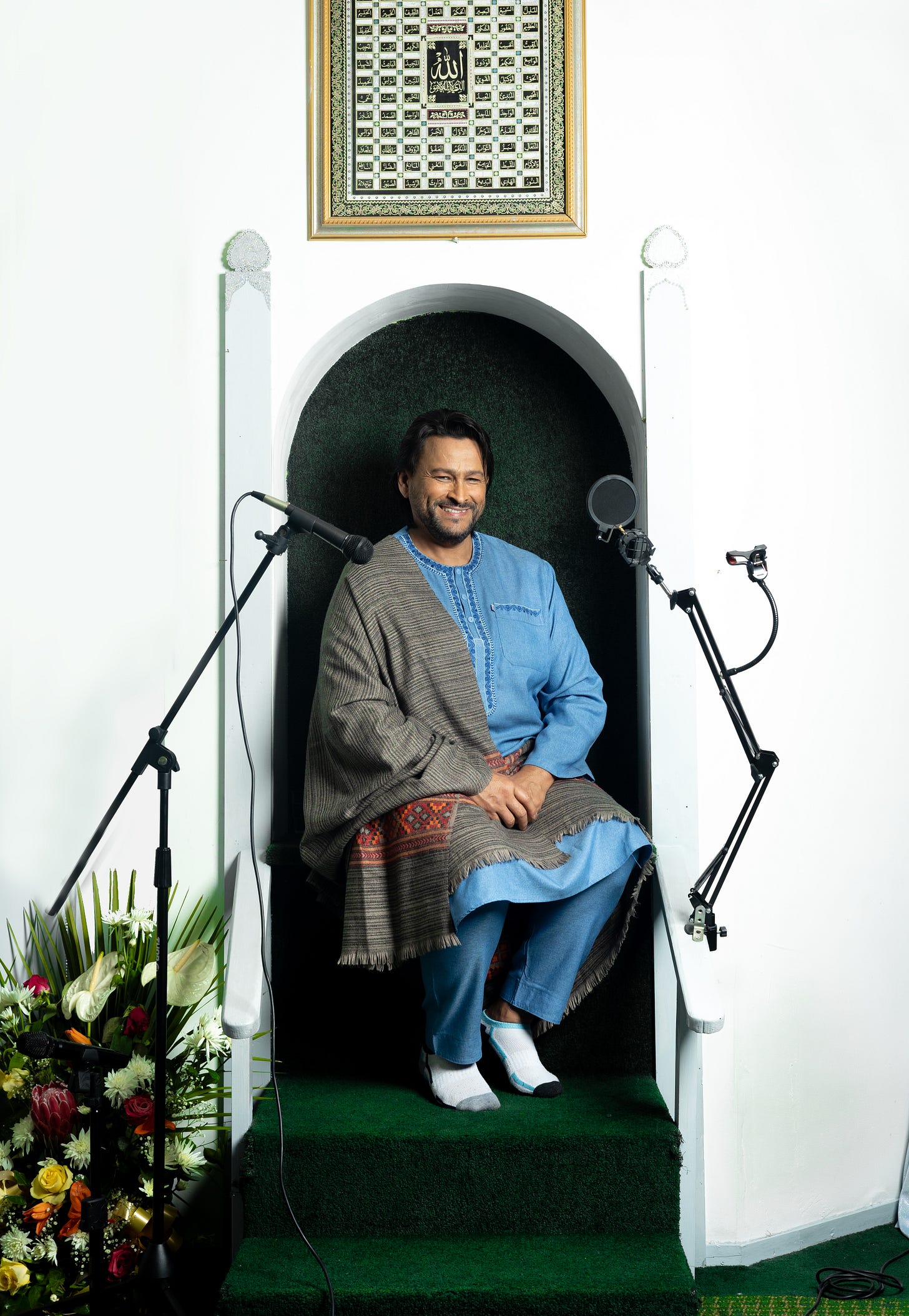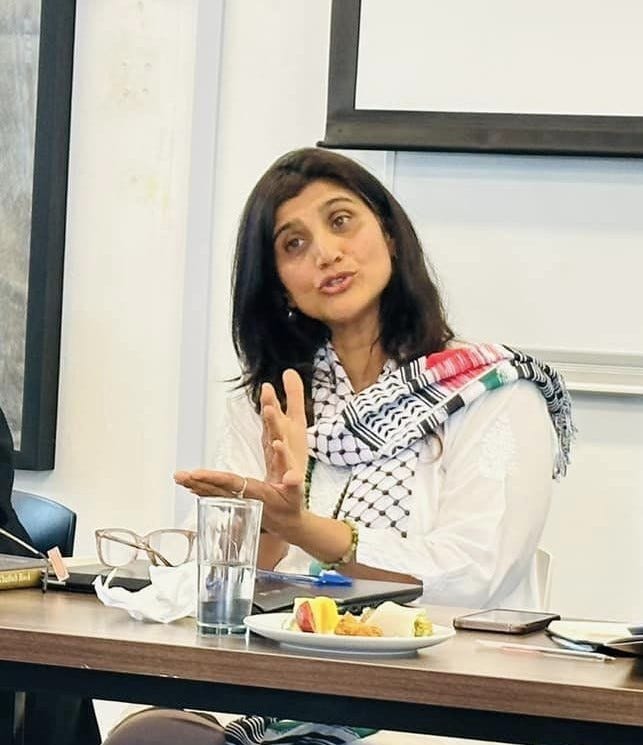Statement on the Assassination of Imam Muhsin Hendricks
by Sa’diyya Shaikh and Fatima Seedat, Co-Directors, Centre for Contemporary Islam
“Indeed to Allah we belong, and indeed, to Allah we return.” (Quran 2:156)
Photo Credit: Tamara Wilson (Instagram @tams.wilson)
We are reeling from the targeted assassination of Imam Muhsin Hendricks, the first openly queer Imam in South Africa. Imam Muhsin was a pioneer in the rights of queer Muslims, having previously led The Inner Circle and more recently the Al-Ghurbaah Foundation. He was recognized as a global leader who created a space to reconcile Islam, faith and sexual diversity, and provided a refuge for young queer Muslims who had been rejected in their homes. Muhsin courageously tracked a path of religious inclusivity and a vision of Islam as a home for all.
Imam Muhsin’s theology was a liberation theology: God is a God of radical love and justice for all human beings. The safe space created by his work brought relief beyond the community of queer Muslims, extending to refugees, people who were homeless, those marginalized without community and belonging, for whom he provided a space of inclusion.
Despite this, we are also reeling from the ways in which some Muslims are condoning his assassination on social media. The compounded horror of such violence and brutality has brought into sharp focus the intense homophobia permeating the Muslim and other faith communities. This is a time for each of us as individuals, as well as in our collectives, whether in mosques, in community organizations, in our Palestinian solidarity formations, to deeply reflect on the ways in which our work for justice must be all-inclusive, and the right to dignity is unconditional.
In the last two years we have witnessed a genocide enabled by the language of dehumanization of Palestinian people. It is the same underlying logic of dehumanization that enables a targeted assassination of a queer human being who stood up for justice. We must recognize that when we are silent in the face of homophobia, patriarchy and Zionism, we enable not only violent systems, but systems that perpetuate violence and death. We are both ethically and spiritually accountable.
The Prophet Muhammad (pbuh) was sent as the “Rahmatal Aalamin”, a mercy to all worlds, everywhere, in all times. Every human being deserves justice and dignity.
Photo Credit: Tamara Wilson (Instagram @tams.wilson)
Imam Muhsin has completed his work on this earth; it is for us to begin ours. Let us have the difficult conversations, let us grow seeds of love, justice and compassion. Let us truly engage what it might be to follow the sunnah of the Mercy to the worlds.
We salute your courage, Shaheed Imam Muhsin. May your soul be embraced in love and compassion by Allah. Dear contented soul, return to your Lord; may your Lord be pleased with you, may you be pleased with your Lord (Quran 87:28-29). May the work of justice, love and inclusivity that you worked so hard towards be realized. May we grow our communities in the work of justice, love and all-inclusive dignity.
Sa’diyya Shaikh is Professor in the Study of Religions at the University of Cape Town. She specializes in the study of Islam, gender ethics, and feminist theory. She has published on Islamic feminism; gender-based violence; Sufism and Islamic Law; spirituality and ethics, and contemporary Muslim women’s embodied ethics. She is author of Sufi Narratives of Intimacy: Ibn ʿArabī, Gender, and Sexuality (2012) and co-author of The Women’s Khutbah Book: Contemporary Sermons on Spirituality and Justice from around the World (2022) She is involved in a number of socially engaged networks as a scholar-activist invested in ways to promote gender justice and social transformation.
Fatima Seedat (PhD Islamic Law, McGill) studies the intersections of gender, sexuality, law and religion. She is Associate Professor and the Head of Department of African Feminist Studies at the University of Cape Town. She has published on Islamic law, Islamic feminism, gendered legal subjectivity, decolonial pedagogy, militarised masculinity and intersectionality. Fatima is a scholar-activist committed to gender-based transformation in communal practices of Muslim family law and religious authority.
Centre for Contemporary Islam
Supported by the following Muslim Academics, Students and Professionals
1. Prof Shireen Abdool Aziz Hassim
2. Prof. Salim Badat
3. Prof Usuf Chikte
4. Dr Shuaib Manjra
5. Dr Cherry Muslim
6. Prof Abdulkader Tayob
7. Dr Kharnita Mohamed
8. Professor Yasmeen Adam
9. Dr Ala Alhourani
10. Dr Sanah Ahsan
11. Prof Ashraf Kagee
12. Zohra Sooliman
13. Sheikh M.Masud Allie al-Azhari
14. Dr Rushdah Lariza Khan
15. Prof Ciraj Rassool
16. Wisaal Abrahams
17. Dr Margherita Picchi
18. Dino Suhonic
19. Dr Salih Solomon
20. Dr Seham Areff
21. Dr Adnane Mokrani
22. Ashraf Mahomed
23. Prof Salim Vally
24. Dr Natasha Vally
25. Dr Lubna Nadvi
26. Naseema Hassan
27. Seemi Ghaziok
28. Rifqah van Schalkwyk
29. Shameme Manjoo
30. Prof Adam Haupt
31. Nabeelah Sujee
32. A/Prof Lee-Shae Salma
Scharnick-Udemans
33. Prof. Scott Siraj al-Haqq Kugle
34. Abdul Karriem Matthews
35. Faaria Theba
36. Amaarah Garda
37. Dr Samah El-Boraei
38. Prof Hassan Mahomed
39. Prof Noor Nieftagodien
40. Dr Ihsaan Bassier
41. Prof Anwar Mall
42. Prof Shanaaz Suffla
43. Ms Nasima Badsha
44. Osasrumwense Asemota
45. Ferial Marlie
46. Aqeelah Bray
47. Dr Suraya Scheba
48. Aneeqah Meyer
49. Prof Saleem Badat
50. Dr Farah Zeb
51. Dr Shaheed Tayob
52. Nadine Cloete
53. Dr Nadira Omarjee
54. Ayesha ul Haqu
55. Seeham Samaai
56. Mujahid Osman
57. Ammaarah Badsha
58. Shehnaz Munshi
59. Dr Feroza Amien
60. Dr. Rosanna Maryam Sirignano
61. Aadila Moolla
62. Dr Faheem Baba
63. Zahraa Mohamed
64. Maya Ghanem
65. Nuriyya Shaikh Kagee
66. Farzanah Samuels
67. Faeza Meyer
68. Ebrahiem Fourie
69. Shameela Seedat
70. Rumana Mahomed
71. Nidaa Husain
72. Shaheen Khan
73. Rizky Etika
74. Daanyaal Loofer
75. Hamza Dudgeon
76. Prof Ramon Grosfoguel
77. Aneesa Moosa
78. Aliya Chikte
79. Hakeemah Matinka
80. Sumayyah Khan
81. Shameelah Khan
82. Jaamia Galant
83. Emer. A/Prof Salma Ismail
84. Dr Asma Salloo
85. Khalid Shamis
86. Garrett Kiriakos-Fugate
87. Dr Amina Mahomed
88. Zuraida Dramat
89. Gulshan Khan
90. Parween Joommal
91. Shaeera Kalla
92. Fatima Khalique
93. Prof Waheeda Amien
94. Prof Shereen Motala
95. Prof Leila Kajee
96. Prof Enver Motala
97. Atiyyah Khan
98. Pervaiz Khan
99. Dr S Dada
100.Ismail Jazbhay
101. Rehad Desai
102. Nabeelah Khan
103. Zaynub Asmal
104. Raeesa Mahomed
105. Prof Ebrahim Moosa
106. Amrain Essop
107. Lamya Moosa, Esq.
108. Dr Mooniq Shaikjee
109. Thomas Mujaahid Mbewu
110. Leila Khan
111. Sieraaj Ahmed
112. Roshan Galvaan
113. May Muna Ahmed
114. Aziz Adams
115. Dr. Summer Pervez
116. Mahvish Ahmad
117. Sakina Godwin
118. Rumana Akoob
119. Waleed Khan
120. Dr Tareq Baconi
121. Dr. Layal Ftouni
122. Aisha Hamdulay
123. Tauriq Jenkins
124. Tariq Desai
125. Dr. Nabila Goga
126. Salma Mirza
127. Dr. Sarah Suhail
128. Dr. Kyla Pasha
129. Prof. Omid Safi
130. Bariza Umar
131. Jamiah Ali
132. Afiq Mohd Noor
133. Samia van Hattum, LCSW
134. Dr Nadeem Mahomed
135. Dr. Ghazala Anwar
136. Dr. Laila Raman-Abdulla
137. Khalid Dhansay
138. Dr Laila Suleman
139. Roshan Sonday
140. Mohamed Imran Mohamed Taib
141. Hameedah Parker
142. Rozana Isa
143. Kazim Ali
144. Zainah Anwar
145. Dr Zeenat Lenina Khan
146. Samah Hadid
147. Hajar Ahjum-Mathee
148. Laeeqa Pangarker
149. Joel Stevens
150. Prof Fatima Fiona Moolla
151. Anjumara Khan
152. Marina Mahathir
153. Carnita Ernest
154. Prof Shahana Rasool
155. Memoona Mahomed
156. Shehnaz Cassim Moosa
157. Dr. Maya Bhardwaj
158. Shafia Mahomed
159. Dr Zahraa McDonald
160. Thaafir Mustapha
161. Faeza Adams
162. Saaliegah Zardad
163. Nariman Laattoe
164. Shaheeda Sadeck
165. Junaid Moosa
166. El-Farouk Khaki
167. Rahma Leuner
168. Asmaa Mohamed
169. Fatima Essop
170. Enver Motala
171. Kareema Mitha
172. Faranaaz Veriava
173. Dr Na-iem Dollie
174. Saleh Bakri
175. Dr Farieda Nazier
176. Dr Greer Valley
177. Lorna Houston
178. Masjaliza Hamzah
179. Zayaan Khan
180. Muminah Salie
181. Dr Noorjehan Joosub
182. Nazeema Mohamed
183. Sikhander Coopoo
184. Shaazia Ebrahim
185. A/Prof Sadiyya Haffejee
186. Dr Leila Ebrahim
187. Yusuf Gamieldien
188. Yusrah Bardien
189. Dr Nasreen Peer
190. Kelly De Lucchi
191. Mitch Yusof
192. Roomaan Leech
193. Altay Yüce Turan
194. Dr Ahmed Veriava
195. Reza Saloojee
196. Dr Iqram Bux
197. Rabia Abba Omar
198. Dr Sofia Tsourlaki
199. Dr Saajidha Sader
200. Ineza Roussille
201. Shireen Brown
202. Kholofelo Molewa
203. Dr Leyya Hoosen
204. Rishqa Brown
205. Ayesha Khan
206. Dr Yaseen Bismilla
207. Dr Asad Zaidi
208. Shamim Meer
209. Dr. Lyana Khairuddin
210. Dr Yasmine Flodin-Ali
211. Dr. Natasha Issa Shivji
212. Tasneem Essop
213. AbdoolKarim Vakil
214. Emer. Prof Shabbir Wadee









On February 18, I saw no one had yet posted about Muhsin Hendricks, so I made a note about him. I'm glad it's the most liked thing I've posted, as it meant that people learned about his life and work.